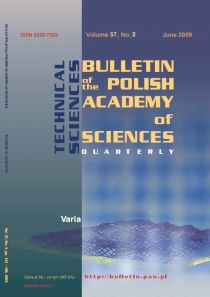POLISH ACADEMY of SCIENCES
TECHNICAL SCIENCES

| BULLETIN
of the
POLISH ACADEMY of SCIENCES TECHNICAL SCIENCES |
 |
|||
|---|---|---|---|---|
| Volume
59, Issue 2, June 2011
|
||||
| Issue Index | Authors Index | Scope Index | Web Info | |
|
|
||||
| Aims&Scope, Subscription | Editors | Authors' guide | to read PDF files | mirror: http://fluid.ippt.gov.pl/~bulletin/ |
| pp 149 - 155 |
|---|
|
Pipeline processing in low-density parity-check codes hardware decoder |
|---|
| W. SULEK |
| Low-Density Parity-Check (LDPC) codes are one of the best known error correcting coding methods. This article concerns the hardware iterative decoder for a subclass of LDPC codes that are implementation oriented, known also as Architecture Aware LDPC. The decoder has been implemented in a form of synthesizable VHDL description. To achieve high clock frequency of the decoder hardware implementation - and in consequence high data-throughput, a large number of pipeline registers has been used in the processing chain. However, the registers increase the processing path delay, since the number of clock cycles required for data propagating is increased. Thus in general the idle cycles must be introduced between decoding subiterations. In this paper we study the conditions for necessity of idle cycles and provide a method for calculation the exact number of required idle cycles on the basis of parity check matrix of the code. Then we propose a parity check matrix optimization method to minimize the total number of required idle cycles and hence, maximize the decoder throughput. The proposed matrix optimization by sorting rows and columns does not change the code properties. Results, presented in the paper, show that the decoder throughput can be significantly increased with the proposed optimization method. |
| Key words: |
|
channel coding, LDPC codes, iterative decoding, decoder implementation, pipelined processing |
|
|
| Issue Index | Authors Index | Scope Index | Web Info |
|---|---|---|---|
|
|
|||
| Aims&Scope, Subscription | Editors | Authors' guide | to read PDF files |
| Copyright ® Bulletin of the Polish Academy of Sciences: Technical Sciences |
|---|